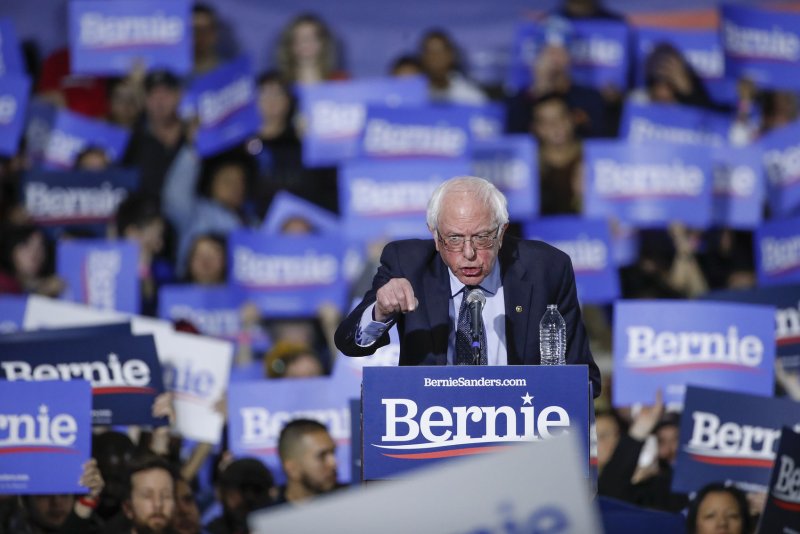1 of 3 | Sen. Bernie Sanders speaks at the second event of his 2020 presidential campaign at Navy Pier in Chicago on Sunday. Photo by Kamil Krzaczynski/UPI |
License Photo
March 5 (UPI) -- Sen. Bernie Sanders is bringing his push for free healthcare and a $15 minimum wage for all Americans to a second grass-roots bid for president, but this time with a larger field of competitors from the Democratic Party.
Sanders, an Independent from Vermont, announced his campaign Feb. 19, calling for support from all who oppose Republican President Donald Trump and "the billionaire class."
"I'm running for president because, now more than ever, we need leadership that brings us together -- not divides us up," Sanders said. "Women and men, black, white, Latino, Native American, Asian American, gay and straight, young and old, native born and immigrant. Now is the time for us to stand together."
Though he primarily only faced former Secretary of State Hillary Clinton in his 2016 presidential bid, he faces more faces a larger slate of candidates in 2020, including: Sen. Cory Booker, D-N.J.; South Bend, Ind., Mayor Pete Buttigieg; former Housing and Urban Development Secretary Julián Castro; former Rep. John Delaney, D-Md.; Rep, Tulsi Gabbard, D-Hawaii; Sen. Kirsten Gillibrand, D-N.Y.; Sen. Kamala Harris, D-Calif.; Sen. Amy Klobuchar, D-Minn.; and Sen. Elizabeth Warren, D-Mass.
Background
Sanders, who earned an undergraduate degree from the University of Chicago in 1964, began his political career when he joined the Young People's Socialist League. After college, he worked in a variety of jobs, including carpentry, writing, teaching and filmmaking.
He was elected to four terms as mayor of Burlington, Vt., in the 1980s before securing his first term in the U.S. House of Representatives in 1990.
Sanders was elected to the U.S. Senate in 2007, now serving his third term. In the Senate, he has served on the budget, environment and public works, energy and natural resources, health, education, labor and pensions and veterans' affairs committees.
During his 2016 presidential campaign, Sanders won 23 primaries and caucuses for about 46 percent of pledged delegates. As in his current campaign, he refused to accept funds from Super PACs.
Sanders, who has been married to his wife, Jane O'Meara, since 1988, has four children -- one biological son and three step-children. He also has seven grandchildren.
On the issues
The 77-year-old is pushing for a Medicare-for-all national healthcare plan and a $15 minimum wage. He said the United States, like Canada, Britain and other European nations, should be able to provide healthcare without out-of-pocket expenses.
"It is not a healthcare issue, it is a political issue, it's an economic issue, it's the power of insurance companies and the drug companies. And I'm prepared to take them on," Sanders said during his announcement.
"It turned out that many of the ideas that I talked about -- that healthcare is a right, not a privilege, and that we've got to move forward toward a Medicare-for-all, a single-payer system: very, very popular," he added. "When I talked about making public colleges and universities tuition-free and lowering student debt, that was another issue that people said was too radical. Well, that's also happening around the country."
Sanders unveiled with New York Gov. Andrew Cuomo in January 2017 a plan for free tuition at New York state colleges.
Besides advocating raising the federal minimum wage from $7.25 to $15 an hour, Sanders also favors legislation to break up "too big to fail" banks, higher taxes for the top income earners and repealing tax breaks for corporations.















